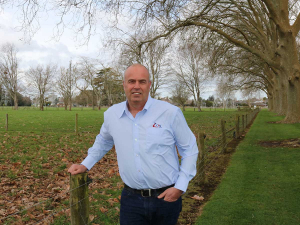Editorial: Time for a reset
OPINION: The Government's recent announcement that methane targets will be reviewed is bringing relief to farmers.
 CRV managing director James Smallwood says genetics has been identified as a means of building a long-term solution to climate change.
CRV managing director James Smallwood says genetics has been identified as a means of building a long-term solution to climate change.
Genetics will play a key role in helping dairy farmers meet climate targets at a herd level, while maintaining the highest quality milk production, says CRV managing director James Smallwood.
His comments come following the release of the Climate Change Commission's final report, which sets out a plan for New Zealand to reduce its emissions and become carbon neutral by 2050.
"Genetics has been identified as a means of building a long-term solution to climate change," says Smallwood.
"As an industry, if cow numbers are reduced farmers will need to improve efficiency per cow to ensure farming remains sustainable, both environmentally and economically.
"With technologies such as genomic testing, we can work with farmers to identify superior animals in their herds.
By combining this technology with precision breeding tools, such as sexed semen from elite bulls, farmers have an opportunity to accelerate their herd's genetic gain in animal efficiency."
Access to quality data is crucial for making smart herd management and breeding decisions.
Farmers can use the data captured on farm from herd testing, DNA testing and herd recording to identify the elite animals that possess traits they want in future dairy herds.
Herd management tools like CRV's myHERD mean all this data can be captured in one place and used to help breed efficient, more sustainable cows, says Smallwood.
He believes meeting the targets recommended in the report will be a big job for both farmers and industry and says they will need support and access to new tools in order to achieve them.
"The industry requires ongoing investment in research, such as the current methane genetic trials. Farmers need tools to be able to accurately measure, report and reduce the environmental footprint of their herd."
CRV's grass-fed genetics breeding programme in New Zealand, combined with the company's global presence and years of investment overseas and locally, means the company is well-positioned to help develop tools and solutions, he says.
CRV Netherlands has been investing in individual feed intake collection for several years and is making excellent progress in terms of giving farmers real tools to breed a herd that produces more milk with less feed.
"Consumers are demanding more information about the provenance of their food. From greenhouse gas emissions and carbon footprint to animal welfare, the spotlight is on New Zealand as a food producing nation.
"CRV has led the way in developing genetic solutions for breeding animals that are polled (hornless) and more tolerant to facial eczema and more efficient. We were also first to market with our sexed semen offering, which enables farmers to breed heifers from their best cows.
"There is no doubt these new targets are challenging, but they also present our dairy industry with an opportunity to step up and further strengthen our global competitive advantage. CRV is committed to working with farmers to do just that," says Smallwood.
Southland farmers are welcoming moves by the Government to repeal intensive winter grazing rules.
Third-year student Cady Burns has won the Waikato Regional Council Prize in Water Science for 2024.
Sam McIvor has been appointed OSPRI’s next chief executive.
The Rural Change programme, providing free private mental health professional sessions to the rural industry, is set to continue its next chapter within Rural Support Trust from 1 July 2024.
Beef + Lamb New Zealand chief executive Sam McIvor will step down in July.
A new report shows farm employers across the dairy, sheep and beef, and arable sectors have continued to invest strongly in one of their greatest assets – their staff.
OPINION: Talking about plant-based food: “Chicken-free chicken” start-up Sunfed has had its valuation slashed to zero by major investor Blackbird…
OPINION: Synlait's financial woes won’t be going away anytime soon.